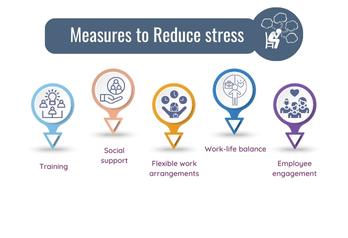Based on a critical review of theory and research, what advice would you give managers to reduce employee stress?
Tagged: Business and management
Employee stress is a significant issue that can affect the productivity and success of organizations. High-stress levels among employees can result in decreased job satisfaction, lower morale, and increased absenteeism, among other adverse outcomes. Therefore, managers need to understand the causes of employee stress and develop strategies to reduce it. This essay will critically review theory and research on employee stress and advise managers on reducing it.
Causes of Employee StressThere are numerous causes of employee stress, including job demands, role ambiguity, lack of control, and interpersonal conflict (Cummings & Worley, 2014). Job demands refer to the amount and complexity of work employees are expected to complete, which can be overwhelming and stressful. Role ambiguity occurs when employees are unsure of what is expected, leading to stress and anxiety. Lack of control refers to the extent to which employees have autonomy over their work, which can cause stress if they feel powerless or unable to influence their work environment. Interpersonal conflict can arise from employee disagreements or tension, leading to stress and tension.
Strategies to Reduce Employee StressBased on the critical review of theory and research on employee stress, there are several strategies that managers can use to reduce stress among their employees (Sauter, Hurrell, & Cooper, 2014).

These strategies include:
Training and development opportunities: Employees with training and development opportunities can help them improve their skills and increase their confidence, leading to reduced stress levels.
Encouraging social support: Creating a supportive work environment where employees can rely on one another for help and advice can help to reduce stress and improve overall job satisfaction.
Offering flexible work arrangements: By giving workers more control over their work and personal lives, flexible work arrangements like telecommuting or flexible schedules can help to lower stress.
Encouraging employee engagement: Encouraging employee engagement can help to reduce stress by fostering a sense of purpose and motivation among employees.
Promoting work-life balance: Encouraging employees to maintain a healthy work-life balance can help reduce stress by ensuring they have time for personal pursuits and relaxation.
ConclusionEmployee stress is a significant issue that can impact the productivity and success of organizations. Based on a critical review of theory and research, managers can reduce employee stress by providing training and development opportunities, encouraging social support, offering flexible work arrangements, promoting employee engagement, and promoting work-life balance. By implementing these strategies, managers can create a more positive and productive work environment for their employees.
References- Cummings, T. G., & Worley, C. G. (2014). Organization development and change. Cengage learning.
- Sauter, S. L., Hurrell, J. J., & Cooper, C. L. (2014). Handbook of work stress. Sage publications.


